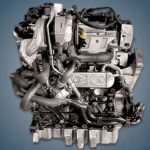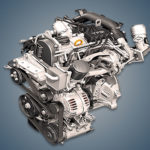The 2.0-liter VW CLCA engine was produced at the enterprises of the concern from 2009 to 2018 and was installed on such popular models as Golf, Jetta, Touran, as well as Skoda Octavia and Yeti. This is the simplest diesel version in this series without swirl flaps and balancer shafts.
The EA189 series also includes: CAYC, CAAC, CAGA, CAHA, CBAB, CFCA, CFGB, CLCA, CLJA, CKTB, CFHC, CKUB.
Specifications
| Production years | 2009-2018 |
| Displacement, cc | 1968 |
| Fuel system | Common Rail |
| Power output, hp | 110 |
| Torque output, Nm | 250 |
| Cylinder block | cast iron R4 |
| Block head | aluminum 16v |
| Cylinder bore, mm | 81 |
| Piston stroke, mm | 95.5 |
| Compression ratio | 16.5 |
| Features | intercooler |
| Hydraulic lifters | yes |
| Timing drive | belt |
| Phase regulator | no |
| Turbocharging | BorgWarner BV40 |
| Recommended engine oil | 5W-30 |
| Engine oil capacity, liter | 4.3 |
| Fuel type | diesel |
| Euro standards | EURO 4/5 |
| Fuel consumption, L/100 km (for VW Touran 2012) — city — highway — combined |
6.8 4.6 5.4 |
| Engine lifespan, km | ~400 000 |
| Weight, kg | 165 |
The engine was installed on:
- Skoda Octavia 2 (1Z) in 2010 – 2013;
- Skoda Yeti 1 (5L) in 2009 – 2015;
- Volkswagen Caddy 3 (2K) in 2010 – 2015;
- Volkswagen Golf 6 (5K) in 2009 – 2013;
- Volkswagen Jetta 6 (1B) in 2014 – 2018;
- Volkswagen Touran 1 (1T) in 2010 – 2015.
Disadvantages of the VW CLCA engine
- This is the simplest version of the diesel without swirl flaps or balance shafts;
- With proper care, the unit runs up to half a million kilometers without problems;
- The Bosch fuel system with electromagnetic injectors is reliable and resourceful;
- The oil separator membrane does not last very long, it has to be changed regularly;
- Also, the EGR valve and the particulate filter are often clogged (in those versions where it is).






